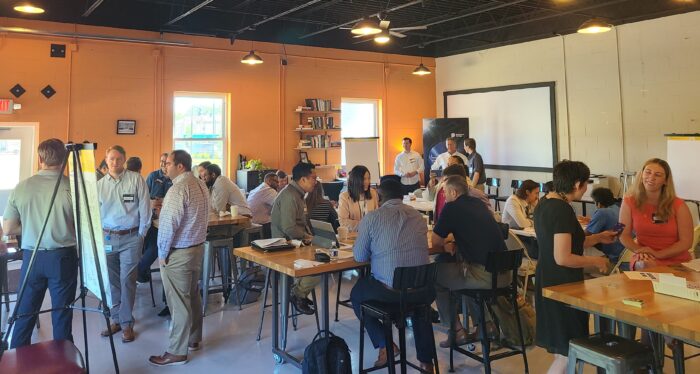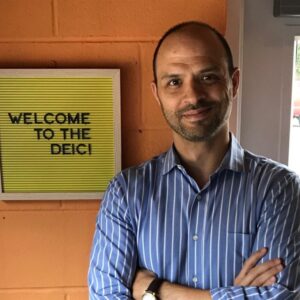
A Dominion Energy Innovation Center program underway at the incubator’s Ashland offices in spring 2022. (Courtesy of Dominion Energy Innovation Center)
The Dominion Energy Innovation Center, an Ashland-based startup incubator, is adding a pitch competition focused on the nuclear and hydrogen energy sectors to its programming lineup.
The DEIC plans to hold the first session of its new Spark Virginia program in late February in Richmond. The program is aimed at budding startup founders in Virginia who have ideas for new nuclear and hydrogen energy technologies they have developed either independently or in university labs.
“We believe there are a ton of commercial (intellectual properties) sitting in universities around the state,” DEIC Director Adam Sledd said. “The idea behind Spark was to start setting up a pipeline program to bring these folks out.”
Spark participants will take part in a 24-hour session that will culminate in a pitch competition with prize money. Participants will be able to meet and collaborate with one another, learn from industry players and workshop their ideas with an eye toward commercialization.
“Let’s get you in the room with people who understand these industries and we’ll wrap up with an opportunity for people to pitch and get prize money for the best ideas,” Sledd said of the program’s concept.
While the program is set to kick off in Richmond, there are plans for similar sessions in Hampton Roads and Northern Virginia in April. The Richmond session is scheduled for Feb. 23-24 at the Shift Retail Lab at 1235 W. Broad St., which is operated by VCU’s da Vinci Center.
Each of the three planned Spark sessions is expected to have individual pots of $8,500, from which awards will be doled out, Sledd said.
Sledd said the program was devised to encourage more Virginians to take the plunge on founding energy startups and to broaden the audience for DEIC’s programming. The center offers an accelerator program, among other resources.
“The accelerator program tends to be more later-stage companies,” he said. “One question we have always had is why there aren’t more Virginia companies. Our accelerator tends to mostly be companies from out of state. ”
Sledd said future Spark sessions could focus on additional climate-conscious energy technologies, such as electric vehicles.
Sledd said that the program’s initial focus on nuclear and hydrogen sources was selected because of those sectors existing presences in Virginia and recent momentum behind development of those energy sources in the Old Dominion.
“Those are two emerging clean-tech fields where Virginia already has a lot going on and there’s a lot of interest in Virginia leading the way,” he said.
The Ashland startup incubator is funding the program through a $50,000 grant it was recently awarded through the Department of Energy’s EPIC Prize challenge. Sledd said the initial funding is expected to carry the program through about four regional sessions. He said the center planned to apply for additional money from that federal program to further expand Spark.
Beyond the creation of prize pools, the remaining federal grant funds are expected to be used to cover costs associated with the operation of the program, Sledd said.
About a year ago, DEIC moved into additional square footage to double the size of its offices at 201 Duncan St. in Ashland, where the center is headquartered and rents out office space to companies.

A Dominion Energy Innovation Center program underway at the incubator’s Ashland offices in spring 2022. (Courtesy of Dominion Energy Innovation Center)
The Dominion Energy Innovation Center, an Ashland-based startup incubator, is adding a pitch competition focused on the nuclear and hydrogen energy sectors to its programming lineup.
The DEIC plans to hold the first session of its new Spark Virginia program in late February in Richmond. The program is aimed at budding startup founders in Virginia who have ideas for new nuclear and hydrogen energy technologies they have developed either independently or in university labs.
“We believe there are a ton of commercial (intellectual properties) sitting in universities around the state,” DEIC Director Adam Sledd said. “The idea behind Spark was to start setting up a pipeline program to bring these folks out.”
Spark participants will take part in a 24-hour session that will culminate in a pitch competition with prize money. Participants will be able to meet and collaborate with one another, learn from industry players and workshop their ideas with an eye toward commercialization.
“Let’s get you in the room with people who understand these industries and we’ll wrap up with an opportunity for people to pitch and get prize money for the best ideas,” Sledd said of the program’s concept.
While the program is set to kick off in Richmond, there are plans for similar sessions in Hampton Roads and Northern Virginia in April. The Richmond session is scheduled for Feb. 23-24 at the Shift Retail Lab at 1235 W. Broad St., which is operated by VCU’s da Vinci Center.
Each of the three planned Spark sessions is expected to have individual pots of $8,500, from which awards will be doled out, Sledd said.
Sledd said the program was devised to encourage more Virginians to take the plunge on founding energy startups and to broaden the audience for DEIC’s programming. The center offers an accelerator program, among other resources.
“The accelerator program tends to be more later-stage companies,” he said. “One question we have always had is why there aren’t more Virginia companies. Our accelerator tends to mostly be companies from out of state. ”
Sledd said future Spark sessions could focus on additional climate-conscious energy technologies, such as electric vehicles.
Sledd said that the program’s initial focus on nuclear and hydrogen sources was selected because of those sectors existing presences in Virginia and recent momentum behind development of those energy sources in the Old Dominion.
“Those are two emerging clean-tech fields where Virginia already has a lot going on and there’s a lot of interest in Virginia leading the way,” he said.
The Ashland startup incubator is funding the program through a $50,000 grant it was recently awarded through the Department of Energy’s EPIC Prize challenge. Sledd said the initial funding is expected to carry the program through about four regional sessions. He said the center planned to apply for additional money from that federal program to further expand Spark.
Beyond the creation of prize pools, the remaining federal grant funds are expected to be used to cover costs associated with the operation of the program, Sledd said.
About a year ago, DEIC moved into additional square footage to double the size of its offices at 201 Duncan St. in Ashland, where the center is headquartered and rents out office space to companies.



